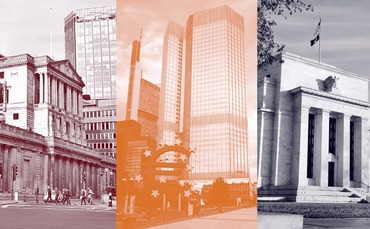Jumana Saleheen, chief economist at Vanguard Europe, said that although the global economy proved to be "more resilient than many expected in 2023, we expect monetary policy will finally begin to bare its teeth next year".
"Central bankers will certainly hope so," she said.
'A tough call': Bank of England dovish move signals 'higher for longer' rates policy
The majority of central banks pursued a policy of continuing interest rate hikes in the first half of the year before moving to a pause in H2, in a bid to achieve a soft landing of the economy and avoid tipping it over into recession.
The Federal Reserve held rates 5.25%-5.5% at its June meeting - still a 22-year high - with the European Central Bank following suit in October at 4% and the Bank of England in November, pausing at 5.25%.
Colin Graham, multi-asset fund manager at Robeco, said that, with hindsight "you could argue that many developed market central banks were a little late in starting the rate hiking process last year".
Indeed, Isabel Schnabel, a member of the European Central Bank's executive board, said in a speech in May that most central bankers had been late to hike rates and had "underestimated the possibility of a return of persistent high inflation".
"[This] affected our monetary policy actions and shaped firms', households' and investors' expectations. Central banks need to reflect on how such factors may have contributed to the build-up of financial fragilities," she said.
BoE's Haskel: Rate cuts will not happen 'anytime soon'
But Graham argued investors could "cut the central banks some slack", especially the ECB, which had to navigate the long-term shock to food and energy prices from the continuing war in Ukraine, and with regards to emerging market institutions "[they] were well ahead of their DM peers in hiking policy rates".
Commenting on the Bank of England and the Federal Reserve specifically, he said that judging by their tightening switch this year, each "seems to have learned from their inflation underestimation in 2022".
Federal Reserve
The Fed was the first to hit the breaks on its interest rate hikes of the major policymakers, and Nancy Curtin, global CIO at AlTi Tiedemann Global, said it appears to have worked in managing inflation and staving off a recession.
"Contrary to 98% of economists who predicted that the US economy would experience a recession this year, it looks like the Fed may just pull off the impossible - lower inflation without a deep and painful recession," she said.
US inflation eased to 3.2% in October, leading the market to begin pricing in rate cuts for summer 2024.
Curtin said this was partly due to Fed chair Jerome Powell "using every tool at his disposal".
Raising rates above the level of inflation while pursuing QT and constantly "jawboning" the market with clear signals, the Fed would pursue higher rates as long as necessary, Curtin said.
Federal Reserve opts to leave rates unchanged but maintains hawkish stance
The CIO added Powell had "just the right amount of policy flexibility combined with a little bit of luck to avoid a recession".
"Markets now expect that Powell can cut rates sooner next year to keep the expansion on track — the definition of soft-landing success," she said.
"No wonder the S&P is up close to 10% in the last few weeks. Investors know that the average 12-month gain post tightening cycle is 20%. Waiting for chair Powell to declare victory may be a fool's (investor) errand."
What happens next?
While markets have begun pricing in rate cuts from key central banks in 2024, Saleheen said it was "clear that higher interest rates are here to stay".
She said: "Fundamental changes to the global economy, in the form of ageing populations and higher structural fiscal deficits, have locked in higher real interest rates."
According to her, this shift in the ‘neutral' rate of interest is the "single most important financial development since the Global Financial Crisis".
"It will have profound implications for the global economy and financial markets, while ushering in a return to sound money."
Governor of the Bank of England Andrew Bailey and a cohort of economists and monetary policy committee members have urged caution about pricing in rate cuts too feverishly in recent weeks, with the central bankers warning that it was not at the end of its journey with regards to managing inflation.
BoE's Bailey: Markets underestimating risk of higher-for-longer inflation
Andy Burgess, fixed income investment specialist at Insight Investment, said that in direct response to the question on whether central banks got it right this year "the answer to that question has to be ‘yes'".
"Major central banks have done just enough to restore their inflation fighting credibility but have now paused as it has become clear that economies are starting to feel the pain of higher rates," he said.
According to him, the biggest question now is what happens next.
Burgess said: "[Central banks are] keen to talk up the idea of a long plateau where rates are maintained at current levels for a considerable period of time and to keep the door open for rate hikes if needed in an attempt to reduce the market appetite for pricing in rate cuts in early 2024.
"We take a more nuanced view on that position with the possibility of a higher neutral policy rate.
"If we are right, central banks are at the start of a tricky path over the longer term. If growth slows, central banks can cut rates which will support risk assets."


